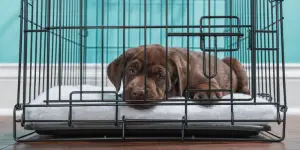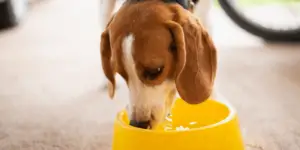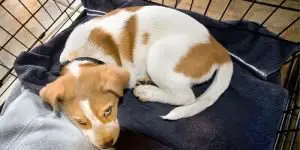
How Much Water Should a Puppy Drink?
- Written by Joshua Gordon
- Last updated
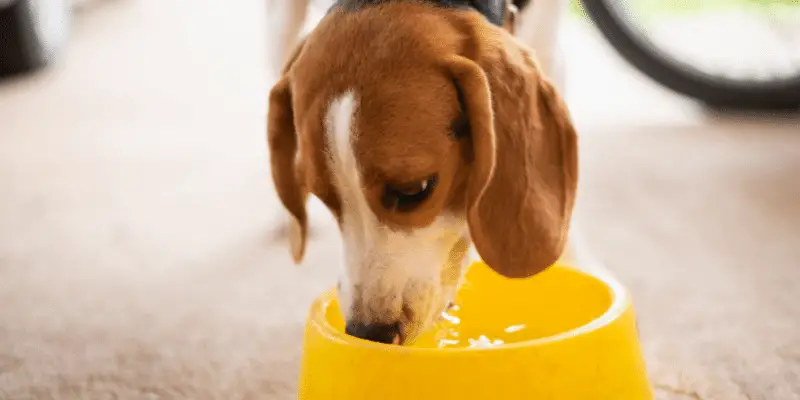
Key takeaways
- How much water a puppy needs to drink depends on its age, weight and activity levels. If your puppy is fully weaned, the general rule is 1 ounce of water per pound of body weight each day. So, an 8-week-old puppy that weighs 5 pounds will need to consume 5 ounces of water every day.
- Water is just as important as food for your puppy. It can be easy for owners to focus on their puppy’s food intake but water is just as important for puppies. Water assists in digestion, blood flow, breathing, and brain activity.
- Stick to a puppy water schedule. Use a schedule to give your puppy (and owner) a routine to avoid missed water intake.
- Be aware of common signs of puppy dehydration. Look out for loss of skin elasticity, panting, dry nose, and dry gums.
In this article
How Much Water Should a Puppy Drink In a Day?
The general rule is 1 ounce of water per pound of body weight each day. For example, an 8-week-old puppy that weighs 5 pounds will need to consume 5 ounces of water every day.
| Puppy weight (Ibs) | Avg daily water intake (Fl oz) |
|---|---|
| 5 lbs | 5 Fl oz |
| 6 lbs | 6 Fl oz |
| 7 lbs | 7 Fl oz |
| 8 lbs | 8 Fl oz |
| 9 lbs | 9 Fl oz |
| 10 lbs | 10 Fl oz |
| 11 lbs | 11 Fl oz |
| 12 lbs | 12 Fl oz |
| 13 lbs | 13 Fl oz |
| 14 lbs | 14 Fl oz |
| 15 lbs | 15 Fl oz |
| 16 lbs | 16 Fl oz |
Alongside adequate food, exercise, and stimulation, ensuring your puppy is drinking enough water per day is key to their development and growth. Not only does water help regulate your pooch’s temperature, but it also aids with metabolic processes, such as brain activity, digestion, blood flow, and even breathing.
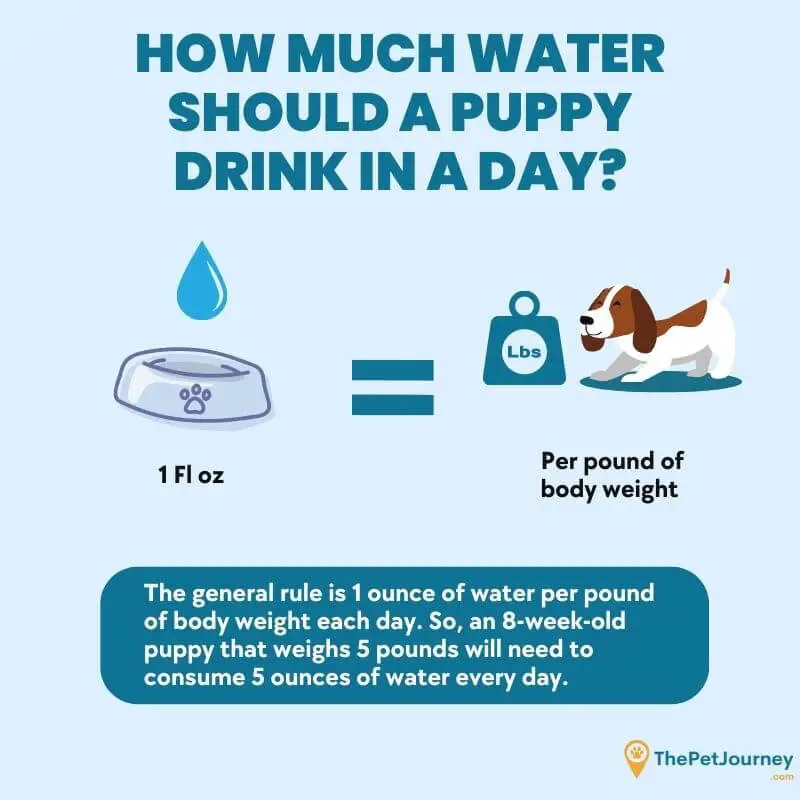
How much water should an 8-week-old puppy drink?
Young puppies need to drink a lot of water to develop properly, and at just 8 weeks old, your pooch still has a lot of growing to do. When working out how much water an 8-week-old puppy should drink, you’ll need to factor in their size, activity levels, and body weight.
For puppies that have not been weaned yet, around half a cup (0.5 ounces) of water every two hours is sufficient. Puppies usually begin weaning at around 3 to 4 weeks old, and this process can last up until 7 to 8 weeks old.
If your puppy is fully weaned, the general rule is 1 ounce of water per pound of body weight each day. So, an 8-week-old puppy that weighs 5 pounds will need to consume 5 ounces of water every day.
Additionally, puppies on dry food will need more water than pooches on wet food.
How much water should a 10-week-old puppy drink?
Again, the amount of water a 10-week-old puppy needs to drink a day depends on their energy levels, body weight, and breed.
The 1 ounce of water per pound of body weight each day can still be applied. For example, a 10-week-old pup that weighs 7 pounds will need 7 ounces of water daily.
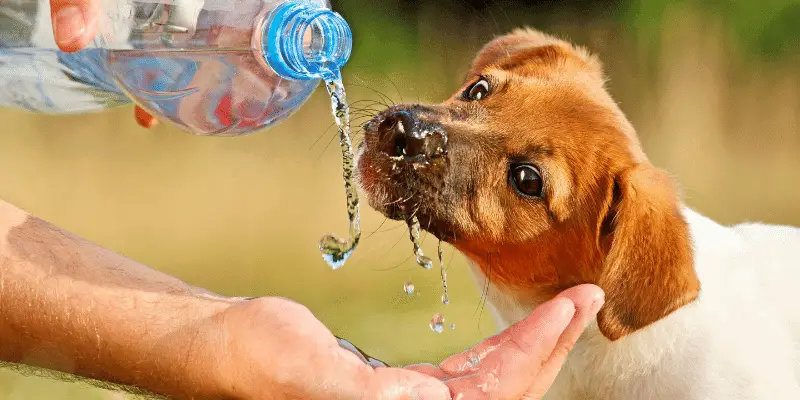
How much water should a 12-week-old puppy drink?
Like with all ages, when figuring out how much water a 12-week-old puppy should drink, you’ll need to consider their weight and activity levels.
A moderately active 12-week-old puppy will need an ounce of water per pound of body weight each day. If your pooch is 9 pounds, then they’ll need 9 ounces of water every day.
How much water should a 6-month-old puppy drink?
At 6 months old, your pooch will need around 1 ounce of water per pound of body weight, though their energy levels will also need to be taken into consideration. If your 6-month-old pup weighs 20 pounds, they’ll require 20 ounces of water daily.
How much water should a puppy drink during potty training?
While the amount of water a puppy should drink during potty training depends on their breed, activity levels, and size (bigger dogs will need more water!), the general guideline is 1 ounce of water per pound of body weight each day.
Inactive puppies may only need around 0.5 ounces of water per pound of body weight each day. On the flip side, if your puppy is extremely active, they may need more than 1 ounce of water daily, especially on hot days.
If you spot any signs of dehydration in your pup like loss of skin elasticity, panting, a dry nose, and dry gums, you should increase their daily water intake.
Although you might be tempted to decrease your puppy’s water intake during the day to lower the number of times they need to relieve themselves, it’s important not to restrict your pooch’s access to water.
Puppies are more at risk of dehydration than adult dogs as they need to drink a lot of water to grow healthily. Decreasing your puppy’s water consumption may also lead them to develop a behavior called resource guarding, which can cause them to act protective and aggressive of toys, food, and water.
We have articles covering common puppy potting training issues such as peeing indoors, peeing too much, and peeing in their sleep.
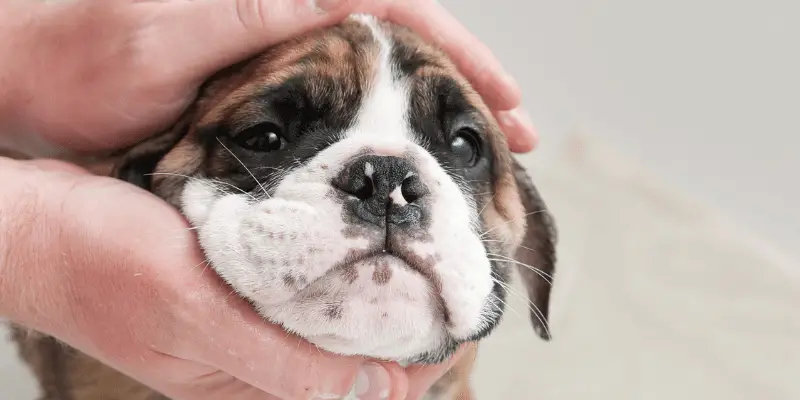
How to tell if your puppy is dehydrated
If you think your puppy is dehydrated, one of the easiest ways to confirm this is to test the elasticity of their skin (known as capillary refill time). Dogs with low fluid levels will have loose skin that doesn’t quickly spring back into place when pinched.
To test the elasticity of your puppy’s skin, gently pinch a piece of skin at the back of your pup’s neck, just before the shoulders. If the skin falls slowly back into place when released instead of instantaneously, it’s likely that your pup is dehydrated.
Another way you can test whether your pup is dehydrated is by pressing a finger against your pooch’s gum until they turn white. When you remove your finger, the area should immediately return to a pink colour. However, if it takes longer for the gums to turn pink, your puppy may be dehydrated.
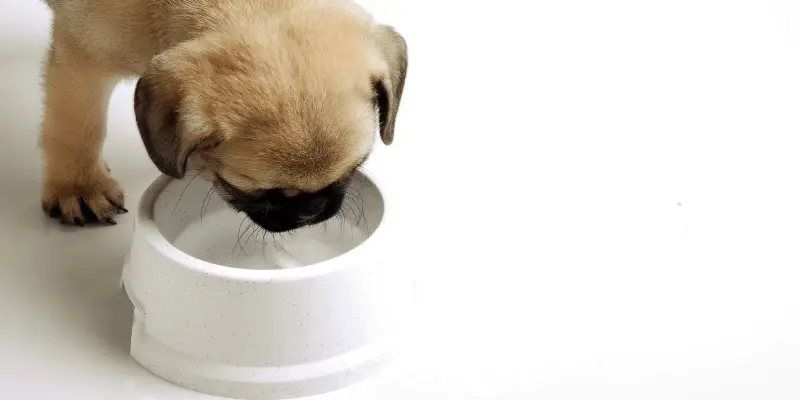
Puppy water schedule
Although your puppy’s water schedule will depend on their age, size, activity levels, and the type of food they eat (pups on dry food will need more wet food), ensuring your pooch drinks around half a cup of water (0.5 ounces) every 2 hours is a good starting point.
Below is an example water schedule that you could use for your pup or adjust to suit your daily routine.
Morning
- 7am: Take your puppy outside to relieve themselves, then offer them food and water. Play with your puppy for a bit afterwards.
- 8am: Let your puppy outside again to do their business. If you need to run some errands, you can put your puppy inside their crate for an hour or so.
- 9am: Offer your puppy some water, then let them outside again. Now might be a good time for a walk or some training!
- 11am: Water time!
Afternoon
- 12pm: Take your puppy outside to relieve themselves. Your pup may be a little sleepy after an exciting morning, so make sure they get some rest if they haven’t already.
- 1pm: Offer your puppy food and water, then take them outside again. If you have some tasks to do, you can put your puppy in their crate for a couple of hours.
- 3pm: Potty break and water time again. You could then squeeze in some bonding or training afterwards!
- 5pm: Let your puppy outside to do their business, then offer them some food and water, making sure to take them outside again around 30 minutes later (puppies digest quickly!).
Evening
- 6pm: Playtime to help tire out your puppy before bed.
- 7pm: Let your puppy outside, then give them a bowl of water before bed.
- 8pm: Quiet time.
- 9pm: Potty break.
- 10pm: Potty break, then bed. If your puppy is extremely young, you may need to set some alarms so you can take them outside to pee/poop during the night.
How to get a puppy to drink more
If your puppy isn’t drinking enough water every day, there are a few things you can do to encourage them to increase their fluid intake, which we’ll be going over below.
- Make sure the water bowl is clean and always filled with fresh water. Change the water at least twice daily.
- Reward your puppy with a treat or some praise whenever they drink. This will help them view drinking water as a positive!
- Offer your puppy ice cubes. Most dogs love chewing on these, especially on a hot day.
- Test a variety of water bowls to see which type your puppy prefers. For instance, some dogs dislike metal water bowls due to the sound they make when they scrape along the floor. If this is the case, you could use a ceramic or glass bowl.
- Flavour your puppy’s water with some bone broth or chicken broth to make it more appetizing. Add around a teaspoon of either to the water. It’s a good idea to have a separate bowl of unflavored water for your pup to drink, too.
- Contact a vet if your puppy is still refusing to drink as they may be suffering from an illness or disease.
Why is water so important for puppies?
Water is so important for puppies because it assists the metabolic processes, which includes digestion, blood flow, breathing, and brain activity. The majority of blood is composed of water, and as it flows through your puppy’s body, it transports oxygen and removes harmful toxins.
If your puppy doesn’t drink enough water, this process can’t happen efficiently, which can lead to organ damage.
Additionally, water regulates your puppy’s body temperature. When a dog is too hot, they will pant. This releases water through evaporation to help keep them cool.
Overhydration in puppies
Although it’s important to make sure your puppy is consuming enough water daily, if your puppy is drinking a lot of water every day, this can also be a cause for concern. Overhydration or water intoxication in puppies can be just as dangerous as dehydration.
Your puppy can overhydrate by drinking an excessive amount of water, especially in a short period of time, or by accidentally ingesting water when they are swimming or being bathed.
If you think your puppy is overhydrated or displays the symptoms below, you should take them to a vet as soon as possible.
- Nausea
- Vomiting
- Loss of coordination
- Lethargy
- Bloating
- Staggering
- Pale gums
- Dilated pupils
- Excessive salivation
Puppies that drink too much water may have polydipsia, which can be a sign of an underlying medical condition like diabetes, Cushing’s disease, kidney issues, or an infection of the uterus. If your puppy is also urinating excessively, it’s even more crucial to get them checked out by a vet.
Final thoughts
While your puppy’s age, body weight, activity levels, and type of food they’re on will need to be factored in when calculating their daily water intake, a good rule of thumb is 1 ounce of water per pound of body weight daily.
Puppies who are highly energetic or on dry food will need more fluids than those who are inactive and on wet food. Always ensure your puppy has access to water on hot days, especially if they have been spending time outside.
Although mild cases of dehydration can usually be treated at home by simply offering your puppy some fresh water or ice cubes, if your puppy is displaying symptoms like shock, collapse, vomiting, or unresponsiveness, seek immediate veterinary attention.
References
- https://www.akc.org/expert-advice/health/puppy-drinking-enough-water/#:~:text=Generally%2C%20young%20puppies%20need%20about,of%20body%20weight%20per%20day
- https://www.thekennelclub.org.uk/health-and-dog-care/health/health-and-care/a-z-of-health-and-care-issues/feeding-your-puppy-from-birth-to-weaning/#:~:text=The%20recommended%20time%20for%20weaning,are%20around%207%2D8%20weeks
- https://www.petmd.com/dog/conditions/urinary/c_multi_polydipsia_polyuria#:~:text=Polydipsia%20refers%20to%20an%20increased,more%20serious%20underlying%20medical%20condition

